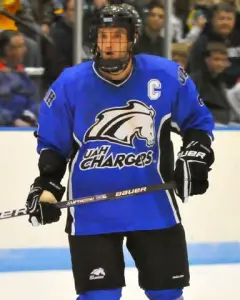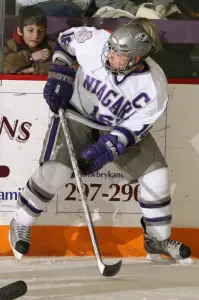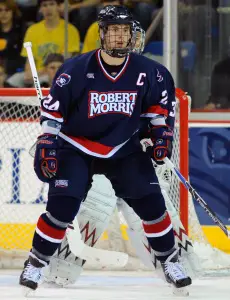O captain, my captain!
The six captains that lead the four CHA teams all bring unique qualities to their respective teams.
How they each came to wear the “C” brings more stories to tell, as well as how each is dealing with the pressure of captaining a Division I team.
Moreover, each will also go down in the history books as the final captain of each team during its CHA days. They’ll probably also be answers to trivia questions years from now.
I recently got to ask each captain the same four questions and true to form, all six captains — Ryan Burkholder (Alabama-Huntsville), Chris McKelvie (Bemidji State), Ryan Annesley, Tyler Gotto and Ryan Olidis (Niagara tri-captains) and Dave Cowan (Robert Morris) — had a wide array of answers.
Read on — some good stuff here.
Ryan Burkholder, UAH
MM: What does it mean to you to captain a D-I team?
RB: First, it is a great honor to be a captain of a D-I hockey team. As a teenager still playing juniors, and even back in minor hockey, it was a goal to play D-I hockey, so when I was named a captain at the end of last year, it was a little bit surreal. Again, a tremendous honor for me.

MM: Describe your leadership style on and off the ice.
RB: I would like to best describe my leadership style as leading by example. On and off the ice, I just try to work as hard as possible and do everything with the best possible attitude. In the dressing room, I try to be vocal when the time calls for it, but mostly I just try to lead by being an exemplary teammate.
MM: As a captain, how do you get the respect of the players on your team once you have the “C” on your jersey?
RB: After the voting and decision of naming me captain, coach [Danton] Cole told me that I was captain because of how I carry myself now. He said this meaning that it was felt that I was fit for the title and that the title didn’t call for a change. That has helped me as a reminder not to try and do too much. I still need to focus on being my best on and off the ice. That is what hopefully gains respect from people.
MM: Have you taken a little something from each captain you’ve played under?
RB: I had the privilege of playing under Scott Kalinchuk for my first two years. He was named as a junior captain as well, so I definitely was able to learn some things from him. His passion and love for the game was so strong that he was able to gain respect simply by wanting to do anything he could to make the team better. He was a good captain and I certainly learned a lot from him.
Chris McKelvie, BSU
MM: What does it mean to you to not only captain a D-I team, but an emerging top-10 team?
CM: First off, it is quite an honor being voted in by your peers. With that, I think it’s really important to give the guys your best and when I fall short to get better the next day. I will say with the group of guys we have, and the tremendous character and leadership by committee, it’s easy pretty easy to do my job. The fact that we are an emerging team just means that more eyes are on us now and it becomes even more important to stay true to our identity that got us here.
MM: Describe your leadership style on and off the ice.
CM: For the most part, my goal is to lead through actions. I definitely don’t shy away from being vocal; I just try and pick my spots so that it is in the best interest of the team. Sometimes it’s easy to get too vocal and guys tend to see right through that. I think it’s critical to put the team first. It’s all about the team, not about the guys with the letters. If I can put forth my best every time and buy into the way we play, it’s a lot easier for guys to follow. We have a lot of great leaders on this team and they all bring something different and I think this is one of the things that make us so successful.
MM: As a captain, how do you get the respect of the players on your team once you have the “C” on your jersey?
CM: We vote for captains here at BSU, so that means the team feels you have attributes worthy of being a captain. I think it’s very important to stay true to what got you there. I’m the same person I was before I was captain. It’s just that now I am in the leadership role and really need consistency on a day-to-day basis. Not to say that that’s not the case without the “C;” it just becomes more magnified.
MM: Have you taken a little something from each captain you’ve played under?
CM: Without a doubt. I think there is something to learn from every teammate. BSU has a long tradition of great captains. So it has been good to learn how these guys were successful and what it took. Also, we are all human, so we have flaws and it’s important to learn from those, too. It’s great to be able to study under captains that were successful here and see what worked and what didn’t and for the most part, I learned a lot about what works and I’m very thankful for that.
Ryan Annesley, NU
MM: What does it mean to you to captain a D-I team?
RA: It is a huge honor to be named a captain at any level, so to be named captain at the D-I level is an even higher regard. This is especially true when you play on a team with 27 or 28 great guys like we have here. It really means a lot.

MM: Describe your leadership style on and off the ice.
RA: As a leader, I am fairly laid back, keeping the mood positive and stepping in when needed. I try to set a good example for the younger guys on and off the ice and I would consider myself to be very talkative during games and practices.
MM: As a captain, how do you get the respect of the players on your team once you have the “C” on your jersey?
RA: I would hope that once the “C” is on your jersey, you already have the respect of your teammates. At the same time, I think that you shouldn’t try to change who you are or what you preach too much when given the “C.” More times than not, you were granted that honor for the type of person or player you already were. Along with that, leading by example both on and off the ice is probably the biggest thing.
MM: Have you taken a little something from each captain you’ve played under?
RA: I have been fortunate to play with some pretty good captains here at Niagara and my fellow captains, Ryan Olidis, Tyler Gotto and assistant captain Jim Burichin (now with the “C” with Annesley injured), are no exception. Each captain has had their own style, but I try to mimic some of the things I’ve learned. Specifically, I’d say that I try to incorporate former captain Matt Caruana’s positive spirit and former assistant captain Travis Anderson’s ability to identify a problem and deal with it quickly.
Tyler Gotto, NU
MM: What does it mean to you to captain a D-I team?
TG: It is a great honor to be the captain of my hockey team. To think of all the great hockey players who have played Division I hockey and how many have been captains, it is something special to be a part of that group. It is a great privilege to wear a “C” on your jersey.
MM: Describe your leadership style on and off the ice.
TG: I am a captain who tries to lead by example on and off the ice. If that means killing penalties, blocking shots, doing extra workouts or helping in the community, I want to give my teammates the proper leadership to follow.
MM: As a captain, how do you get the respect of the players on your team once you have the “C” on your jersey?
TG: I make sure all my teammates know where my priorities lie, that they are with winning and the success of my teammates. As a captain, my teammates know that I will do anything for them, be it on or off the ice. They need to know that my personal priorities are in line with theirs and our team.
MM: Have you taken a little something from each captain you’ve played under?
TG: Every captain I have played under has had a different manner of how they go about leading a team. I think I have learned a lot from the different leaders I have followed and have incorporated different aspects of each. One captain I had in junior always made sure the team was close outside the rink. I have tried to incorporate that with the teams I have
played on since. Whether it be going to movies together or having team barbecues, I feel that teams need to spend bonding time together away from the rink. It builds a stronger team on the ice.
Ryan Olidis, NU
MM: What does it mean to you to captain a D-I team?
RO: For me, to be a captain of Niagara is truly an achievement. It means a lot to me as a player of the program that guys on the team and the coaching staff believe in me and respect me enough to give me a role as a captain. It’s a great privilege and an honor to be a captain for the Niagara Purple Eagles and is something that will stay with me forever.
MM: Describe your leadership style on and off the ice.
RO: I think I can best describe my leadership style as a voice for the team and someone that leads by example. We have a lot of young guys on our team and my actions and attitude on and off the ice is something that guys look up to and I can only hope that they are footsteps which others will follow.
MM: As a captain, how do you get the respect of the players on your team once you have the “C” on your jersey?
RO: I am a firm believer of leading by example. If I do the right things on and off the ice and work hard in the classroom, guys will follow my lead. Also, there are times when a voice needs to be heard and personal friendship needs to be put aside in order to keep things in line for the better of the team. Whether it’s being a voice or leading by example, everyone has to earn respect and guys will listen and give you the respect you need when you’re the person that takes control and steers the ship.
MM: Have you taken a little something from each captain you’ve played under?
RO: In my four years at Niagara, I have definitely taken a little something from each and every single captain I have played under. As I’ve said, there are different types of leaders and we’ve had them all. Some are more of the silent type and some are the vocal type and it’s always good to have a little bit of both on your team.
Dave Cowan, RMU
MM: What does it mean to you to captain a D-I team?
DC: It’s a great honor when you are given the opportunity to be captain of any program or organization. As the captain of such a young program like Robert Morris, I feel that it is very important to try and build a strong foundation for my current teammates and future RMU teams. It’s great to see how far the program has come in such short time and this can be accredited to the past captains and players.

MM: Describe your leadership style on and off the ice.
DC: I try to lead by example on the ice, while still being a vocal leader in the dressing room when it is needed. Our team is made up of more than just a couple leaders who wear letters. With such a tight-knit group of guys, not much talking is needed in the dressing room. Guys know what is expected of them and they all do their best to produce.
MM: As a captain, how do you get the respect of the players on your team once you have the “C” on your jersey?
DC: Most teams delegate their captains according to votes by the players. I was fortunate enough to be chosen by my teammates to be captain and I am very proud of that. Teams select captains based upon their leadership skills before they become a captain. I try not to change my attitude or leadership style because I have a letter on my jersey. I would lead the same with or without the “C” on my chest.
MM: Have you taken a little something from each captain you’ve played under, including your brother, Rob, at Robert Morris?
DC: I think that it is very important to try and learn from older guys and past captains. I think that everyone has their own leadership styles and it is important to try and take a little from past captains to fit your style. I was lucky enough to play under my brother in university and in junior and look up to him a great deal. He is the best captain I have ever played under and I try to take as much as I can from him. Although our leadership styles are a bit different, I try to emulate him in many ways. Rob was the captain at RMU for the first four years of the program and was a huge part in the progression of the team. I hope I am able to pass on some of my leadership skills to my teammates to help the future of the program.


